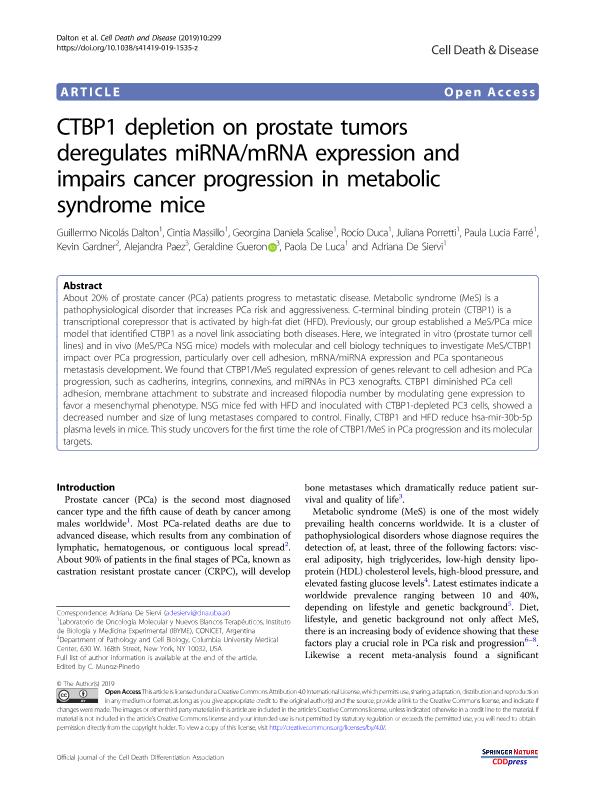Artículo
CTBP1 depletion on prostate tumors deregulates miRNA/mRNA expression and impairs cancer progression in metabolic syndrome mice
Dalton, Guillermo Nicolás ; Masillo, Cintia; Scalise, Georgina Daniela; Duca, Rocío Belén
; Masillo, Cintia; Scalise, Georgina Daniela; Duca, Rocío Belén ; Porretti, Luciana; Farré, Paula Lucía
; Porretti, Luciana; Farré, Paula Lucía ; Gardner, Kevin; Páez, Alejandra; Gueron, Geraldine
; Gardner, Kevin; Páez, Alejandra; Gueron, Geraldine ; de Luca, Paola
; de Luca, Paola ; de Siervi, Adriana
; de Siervi, Adriana
 ; Masillo, Cintia; Scalise, Georgina Daniela; Duca, Rocío Belén
; Masillo, Cintia; Scalise, Georgina Daniela; Duca, Rocío Belén ; Porretti, Luciana; Farré, Paula Lucía
; Porretti, Luciana; Farré, Paula Lucía ; Gardner, Kevin; Páez, Alejandra; Gueron, Geraldine
; Gardner, Kevin; Páez, Alejandra; Gueron, Geraldine ; de Luca, Paola
; de Luca, Paola ; de Siervi, Adriana
; de Siervi, Adriana
Fecha de publicación:
04/2019
Editorial:
Nature Publishing Group
Revista:
Cell Death & Disease
ISSN:
2041-4889
Idioma:
Inglés
Tipo de recurso:
Artículo publicado
Clasificación temática:
Resumen
About 20% of prostate cancer (PCa) patients progress to metastatic disease. Metabolic syndrome (MeS) is a pathophysiological disorder that increases PCa risk and aggressiveness. C-terminal binding protein (CTBP1) is a transcriptional corepressor that is activated by high-fat diet (HFD). Previously, our group established a MeS/PCa mice model that identified CTBP1 as a novel link associating both diseases. Here, we integrated in vitro (prostate tumor cell lines) and in vivo (MeS/PCa NSG mice) models with molecular and cell biology techniques to investigate MeS/CTBP1 impact over PCa progression, particularly over cell adhesion, mRNA/miRNA expression and PCa spontaneous metastasis development. We found that CTBP1/MeS regulated expression of genes relevant to cell adhesion and PCa progression, such as cadherins, integrins, connexins, and miRNAs in PC3 xenografts. CTBP1 diminished PCa cell adhesion, membrane attachment to substrate and increased filopodia number by modulating gene expression to favor a mesenchymal phenotype. NSG mice fed with HFD and inoculated with CTBP1-depleted PC3 cells, showed a decreased number and size of lung metastases compared to control. Finally, CTBP1 and HFD reduce hsa-mir-30b-5p plasma levels in mice. This study uncovers for the first time the role of CTBP1/MeS in PCa progression and its molecular targets.
Palabras clave:
CBTP1/MES
,
PROSTATE CANCER
,
METASTASIS
,
XENOGRAFTS
Archivos asociados
Licencia
Identificadores
Colecciones
Articulos(IBYME)
Articulos de INST.DE BIOLOGIA Y MEDICINA EXPERIMENTAL (I)
Articulos de INST.DE BIOLOGIA Y MEDICINA EXPERIMENTAL (I)
Articulos(IQUIBICEN)
Articulos de INSTITUTO DE QUIMICA BIOLOGICA DE LA FACULTAD DE CS. EXACTAS Y NATURALES
Articulos de INSTITUTO DE QUIMICA BIOLOGICA DE LA FACULTAD DE CS. EXACTAS Y NATURALES
Citación
Dalton, Guillermo Nicolás; Masillo, Cintia; Scalise, Georgina Daniela; Duca, Rocío Belén; Porretti, Luciana; et al.; CTBP1 depletion on prostate tumors deregulates miRNA/mRNA expression and impairs cancer progression in metabolic syndrome mice; Nature Publishing Group; Cell Death & Disease; 10; 4; 4-2019; 1-12
Compartir
Altmétricas



